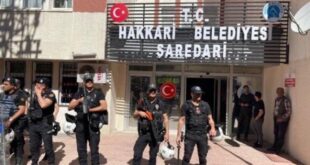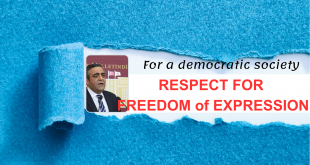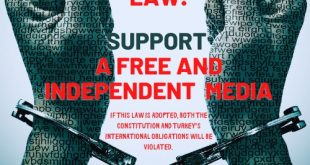 IHOP released the KCK Trial Monitoring Report at a press conference in Ankara on 15 April 2011. The report was prepared within the framework of IHOP’s studies focusing on the rule of law.
IHOP released the KCK Trial Monitoring Report at a press conference in Ankara on 15 April 2011. The report was prepared within the framework of IHOP’s studies focusing on the rule of law.
Lawyers Hüsnü Öndül, Murat Dinçer and Kerem Dikmen examined the KCK case and prosecution on the basis of international human rights law, including the European Convention on Human Rights, associated additional protocols, and decisions adopted by the European Court of Human Rights.
Please click the link below to reach the English version of IHOP’s KCK Trial Monitoring Report:
IHOP REPORT ON THE DIYARBAKIR KCK CASE: Human Rights, the Rule of Law, and the Protection of Human Rights Defenders
(Pdf, 255 KB)
(Please click here for the Turkish version.)
CONTENTS:
SUMMARY
INTRODUCTION
1. INVESTIGATION STAGE
1.1. PRELIMINARY INVESTIGATION
1.2 START OF INVESTIGATION
1.3 BEFORE THE -ARRESTS
1.3.1. Listening to telephone conversations, identification of IP addresses and electronic mails
1.3.2. Use of technical devices for surveillance and recording conversations
2. DETENTION AND ARREST
2.1 Searches and Seizures
2.2. Secrecy orders
2.3. Secret Witnesses
4. PROSECUTION
4.1 Main issues raised by this trial
4.1.1. Pre-trial detention
4.1.2. Torture or Humiliating Treatment
4.1.3. Right to privacy and private communication
4.1.4. Right to defence in own language and to furnish evidence freely
5.HUMAN RIGHTS DEFENDERS IN PRISON
5.1.ROZA ERDEDE
5.2. ARSLAN ÖZDEMIR
5.3. MUHARREM ERBEY
6. CONCLUSION
The report’s conclusions are summarized below:
- Human rights defence under threat of criminal investigation: Rights defenders are of course not immune from prosecution and penalty and their status as human rights defenders cannot be taken as the sole indicator of their innocence. Rights defenders too may be involved in offences, but the investigation and prosecution of such offences cannot be used as a way of restricting the defence of human rights.
However, examining the indictment in this specific case, it is observed that the prosecutor has viewed as an offence the activities and recorded communications of the chair and board members of the Diyarbakir Branch of Human Rights Association, which cannot be construed in any other terms but as normal associational activities, and a part of their mission as human rights defenders. This necessarily leads to the inference that defending human rights constitutes an offence and consequently that activities in the defence of human rights are threatened and termed criminal acts. This is a violation of the state’s national and international obligations to human rights defenders. - Humiliating treatment at the stage of interrogation: Violations such as torture and ill-treatment were not mentioned during interviews conducted while preparing the present report. Nevertheless, lining up handcuffed suspects before security units during the first wave of detentions is considered as humiliating treatment.
- Length of pre-trial detention violates the presumption of innocence: Pre-trial prison detention is a precaution not a punishment. Since it deprives persons of their liberty, this is considered as the most serious measure available and should be resorted to only if alternative measures are not available. As all the evidence in this case has already been collected the prolongation of prison detention at this stage must be considered a breach. Furthermore, the argument that there is serious breach here is further supported by the fact that some defendants in the trial charged with the same offence on the basis of the same articles of the Penal Code are at liberty.
- The accused cannot use their native language: Many persons accused have stated that their own language is Kurdish and that they wish to defend themselves in that language. This request has been turned down by the court. The fact that the use of own language can be the subject of a request itself indicates that there is a breach of human rights here. The use of one’s own language is essential. The court’s refusal in this respect is a violation of a right.
- No evidence in favour of the defendants can be collected: The right of the accused to defend themselves has been restricted in this case. Procedural regulations do not provide that bringing an expert before the court to submit evidence requires authorization. Yet, the court did not allow Professor Baskin Oran, whom defence lawyers had invited to testify before the court, to submit the opinion that legal defence in own language is provided for by international conventions to which Turkey is a State Party. This situation means the violation of the principle pertaining to collecting ex culpatory evidence for the accused.
- Freedom of expression violated: Examining the indictment, it is found that even peaceful expressions are made the subject of criminal prosecution, which amounts to the violation of freedom of expression.
- Rights granted by the state made subject to prosecution: The right to petition the state, to peaceful assembly and demonstration, among other rights, are safeguarded by the state. However, in the KCK case the exercise of these rights is criminalized. This situation threatens the exercise of the right to demonstrate. Furthermore, many activists in the fields of women’s rights and environmental rights and their activities in the civil sphere face criminal investigation regardless of the content. A right is a gain where effective exercise is as important as formal entitlement. Making the forms of exercising these rights subject to judicial examination is tantamount to cancelling out the positive recognition of these rights. Investigation and prosecution of the members of women’s and environmental organizations just for their activities is considered as a violation of rights.
- Privacy of communication under threat: Interviews conducted suggest that the State failed to fulfil its negative and positive obligations in relation to the interception and recording of telephone conversations and other communications.
BACKGROUND INFORMATION:
151 people, including human rights defenders, are on trial
Several members of the Peace and Democracy Party (BDP), along with mayors, municipal officers, executive members of trade unions and several other associations, were detained in operations starting in April 2009. Many of them were arrested and put on trail. For the time being, there are 151 defendants on trial and 103 of them are held in pre-trial detention. Most of them are mayors elected to local government as DTP/BDP candidates, former mayors from the DTP, local government personnel, and leaders and members of non-governmental organizations. All are residents of the region, well known for their social activities. Among the defendants are Muharrem Erbey, a lawyer and Deputy Chairperson of the Human Rights Association (IHD), and executive members of the Diyarbakir Branch of IHD, Roza Erdede and Aslan Özdemir.
The case is publicly known as the “KCK trial.”
Executive members of the Human Rights Association Muharrem Erbey, Roza Erdede and Aslan Özdemir have been subjected to investigations mainly because of their work as human rights defenders. They were subsequently arrested in the course of an operation that began in April 2009. This practice, which can be called “judicial pressure” on human rights defenders, is a form of political persecution that is totally unacceptable in a democratic society.
Many of the defenders who appeared in court are persons who work within legal and legitimate platforms such as municipalities, associations, trade unions and political parties. No one should be subjected to investigation, detention or arrest because of the work they perform at legal, legitimate and peaceful organizations, nor should these activities be brought against them as if they were crimes. Such practices show a lack of judicial security and damage the principle of the rule of law.
The principle of the rule of law, which is one of the key principles for the protection and promotion of human rights and liberties, guarantees effective monitoring and protection of personal rights and liberties against intervention by public officials. This protection and oversight is the duty of the judiciary, which should be independent and impartial.
The Human Rights Joint Platform (IHOP) monitors the trial with respect to the right to “personal liberty and security” and the right to a “fair trial”. In particular, IHOP monitors the proceedings against the human rights defenders Muharrem Erbey, Roza Erdede and Aslan Özdemir within the framework of the UN Declaration on Human Rights Defenders.
The next hearing of the trial will be held in Diyarbakir on 19 April 2011.
Please follow the link for IHOP’s press statement on this trial (18 October 2010): IHOP will monitor the trial against human rights defenders
 HRJP Human Rights Joint Platform
HRJP Human Rights Joint Platform



